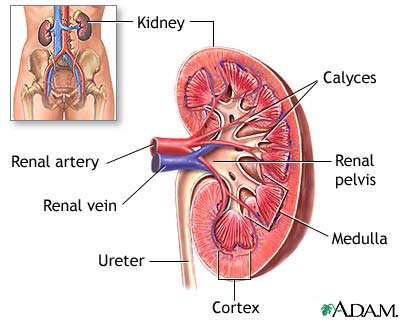Symptoms & Signs
* Bloody stools
* Breath odor
* Bruising easily
* Changes in mental status or mood
* Decreased appetite
* Decreased sensation, especially in the hands or feet
* Fatigue
* Flank pain (between the ribs and hips)
* Hand tremor
* High blood pressure
* Metallic taste in mouth
* Nausea or vomiting, may last for days
* Nosebleeds
* Persistent hiccups
* Prolonged bleeding
* Seizures
* Slow, sluggish movements
* Swelling – generalized (fluid retention)
* Swelling of the ankle, foot, and leg
* Urination changes:
o Decrease in amount of urine
o Excessive urination at night
o Urination stops completely
Diagnosis & Tests
Many patients have generalized swelling caused by fluid retention. The doctor may hear a heart murmur, crackles in the lungs, or signs of inflammation of the lining of the heart when listening to the heart and lungs with a stethoscope.

The results of laboratory tests may change suddenly (within a few days to 2 weeks). Such tests may include:
* BUN
* Creatinine clearance
* Serum creatinine
* Serum potassium
* Urinalysis
A kidney or abdominal ultrasound is the preferred test for diagnosing kidney failure, but abdominal x-ray, abdominal CT scan, or abdominal MRI can tell if there is a blockage in the urinary tract.
Blood tests may help reveal the underlying cause of kidney failure. Arterial blood gas and blood chemistries may show metabolic acidosis.
-
Acute kidney failure: Overview, Causes
-
Acute kidney failure: Symptoms & Signs, Diagnosis & Tests
-
Acute kidney failure Treatment
Reviewed By : Parul Patel, MD, Private Practice specializing in Nephrology and Kidney and Pancreas Transplantation, Affiliated with California Pacific Medical Center, Department of Transplantation, San Francisco, CA. Review provided by VeriMed Healthcare Network. Also reviewed by David Zieve, MD, MHA, Medical Director, A.D.A.M., Inc.
